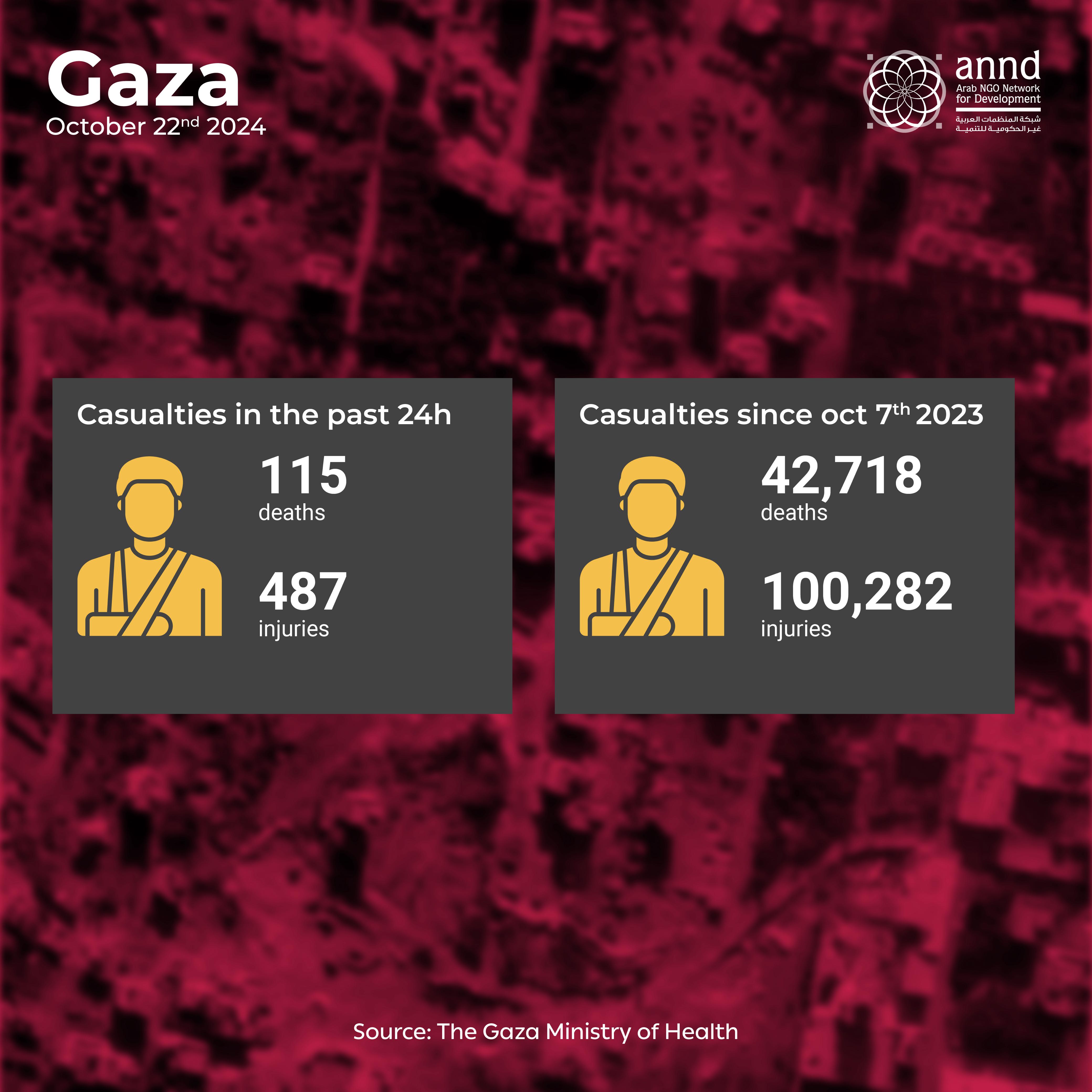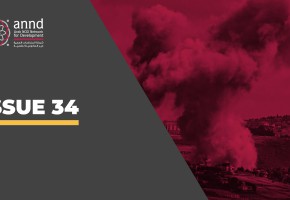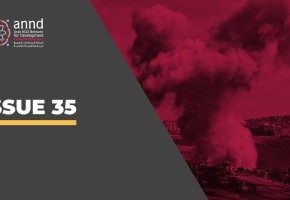Israel committed a massacre targeting a densely populated residential area near Rafic Hariri Governmental Hospital in the Jinah neighborhood of Beirut, killing 18 civilians and injuring 60, 7 of whom are in critical condition, according to the Ministry of Public Health. Later, the Israeli army announced it had struck a Hezbollah target near the hospital late Monday night.
The Israeli military also said its air force struck a central camp for Hezbollah's naval unit in the Ouzai area of Beirut last night, prompting Beirut International Airport authorities to change the landing strip for Middle East Airlines due to the proximity of the strike location. The Israeli army warned civilians in the al-Housh area near Tyre to evacuate their homes immediately, and the area was subsequently targeted with over 15 airstrikes.
In Nabatieh, southern Lebanon, Israeli airstrikes destroyed the commercial market, municipality building, and residential and commercial complexes in what is the third major attack in less than two weeks. The strikes, which began at 2:00 PM, leveled numerous residential and commercial buildings and several shops and cafés.
The southern suburbs of Beirut also came under fire, with two buildings razed to the ground 15 minutes after an evacuation warning was issued. Four other areas in the southern suburbs were similarly warned, causing panic and increasing the number of people fleeing to safer zones.
Additionally, Israel issued new threats to Lebanon's healthcare sector, specifically targeting Sahel Hospital in the heart of the southern suburbs. Israeli army spokesperson Avichay Adraee claimed on X that Hezbollah stored millions of dollars in cash and gold under Sahel Hospital to finance its activities. In response, the hospital was evacuated at the request of its owner, MP Fadi Alameh, who insisted the hospital had no ties to any parties. Alameh called on the Lebanese army to inspect and confirm the absence of tunnels underneath the hospital. Later, the Israeli military clarified it would not target Sahel Hospital.
Lebanon's Hospital Syndicate condemned the threats against Sahel Hospital, labeling the accusations as baseless, and called on the international community to ensure the protection of healthcare facilities in line with international law. Earlier today, the administration of Sahel Hospital organized a tour for journalists to inspect the facility, aiming to "dispel the Israeli army's claims from yesterday about the existence of tunnels and hideouts beneath its building on the airport road, supposedly containing millions of dollars in cash and gold."
It is worth noting that since the beginning of the ground war on Lebanon, Israeli airstrikes have hit a large number of hospitals and their surrounding areas, rendering them out of service. Many health centers, paramedics, and ambulances, as well as civil defense personnel, have also been targeted. There are growing fears that Israel might repeat the same tactics it used against hospitals in Gaza.
The Director General of the Ministry of Health, speaking from Rafic Hariri Governmental Hospital, emphasized that the hospital sector is entirely separate from any non-medical activities and called on the international community to act and exert pressure to keep this sector out of Israel's campaign of genocide against Lebanon.
The Director of Rafic Hariri Hospital also announced that the damage to the hospital is severe and needs to be repaired as soon as possible, stressing that there would be no evacuation, and operations will continue.
Hezbollah has launched operations to repel Israeli army advances on several fronts in the south, targeting Israeli military sites, positions, and settlements in northern and central Israel. The group fired rockets at the "Stella Maris" naval base northwest of Haifa, and at the Glilot base, home to Military Intelligence Unit 8200, as well as the Nir Yitzhak Iron Dome battery in the suburbs of Tel Aviv, using advanced missiles.
Over the past 24 hours, 125 airstrikes and bombings were recorded in various parts of Lebanon, mostly concentrated in the south and the Bekaa, bringing the total number of attacks since the start of the aggression to 10,775. According to the Ministry of Health, 63 martyrs and 234 wounded were reported in the past 24 hours, raising the total death toll to 2,530 martyrs and 11,803 wounded since the beginning of the aggression.
Later in the evening, the bodies of Hashem Safi al-Din and 23 others who were with him in the meeting targeted by Israeli airstrikes on October 5 were recovered. Safi al-Din was considered the successor to Hezbollah's Secretary-General Hassan Nasrallah, who was assassinated in a similar airstrike on September 27, 2024.

Political Positions in Lebanon
MP Gebran Bassil, head of the Free Patriotic Movement, told Al Arabiya that "Hezbollah has removed Lebanon’s justification for self-defense by supporting Gaza," noting that the movement disagreed with Hezbollah on supporting Gaza. Bassil said that "Hezbollah has weakened itself, and we have lost Lebanon's strength, and he blamed the party for making a mistake with the “unity of fronts” strategy. He also said that Iran should fight Israel directly, not through another party. Bassil revealed that the Free Patriotic Movement is no longer in an alliance with Hezbollah, stating that the current war began with Hezbollah's attack on Israel. However, he emphasized that Israel seeks to weaken all the Lebanese, and said the weapons currently defending Lebanon cannot be taken away.
Hezbollah's media relations officer, Mohammed Afif, said in a press conference that Hezbollah has full and complete confidence in Speaker of Parliament Nabih Berri, stressing that there will be no negotiations under fire. He declared Hezbollah's sole responsibility for the Caesarea operation and the targeting of Israeli Prime Minister Netanyahu's residence. He also said that the U.S. is a partner in Israel's aggression against Lebanon and its people, supplying Israel with weapons and ammunition. Afif criticized what he referred to as "the bias" of some Arab and local media in favor of Israel.
He clarified that the Al-Qard Al-Hassan Foundation is a civilian institution licensed by law, providing services to all Lebanese. He emphasized that Hezbollah does not receive salaries, budgets, or funding for weapons from it, as it operates as a contractual institution between depositors and beneficiaries, with no involvement from the party.
Afif also accused Israel of disregarding the ethics of war and international laws, holding it responsible for the safety of hostages, and called on the International Red Cross to fulfill its responsibilities.
The mayor of Rmeish in southern Lebanon stated that the residents will not leave their land and will not give it up easily, and that they are receiving assistance from the Lebanese army. The residents of Rmeish had protested in front of the Internal Security Forces station in the village, which had received orders to withdraw, and they succeeded in forcing the Ministry of Interior to reverse its decision.
Lebanese embassies abroad announced in a statement their activities within the framework of "the diplomatic efforts of Lebanese missions abroad to gather support for Lebanon and secure humanitarian aid needed by the Lebanese people in the face of Israeli aggression." The statement included a summary of the embassies' efforts to collect donations from countries and international organizations.
Humanitarian Response: Lebanon Needs $250 Million Monthly
A total of 1,095 shelter centers for displaced persons have been set up, with 908 of them already at full capacity. Displacement continues from areas under daily attacks to safe regions. The total number of registered displaced persons has reached 191,516, consisting of 44,124 families, with the highest percentages located in Mount Lebanon and Beirut. However, the actual number of displaced individuals is likely much higher. Between September 9 and October 22, 2024, 343,404 Syrian citizens and 147,608 Lebanese citizens crossed into Syrian territory.

Two days before the upcoming Paris Conference on Thursday to gather support for Lebanon, Environment Minister and head of the National Emergency Committee Nasser Yassin told Reuters that government efforts, supported by local initiatives and international aid, have only covered 20% of the needs for about 1.3 million displaced persons currently living in public buildings or with relatives.
Yassin stated that these needs are likely to increase, explaining that $250 million is needed monthly to cover basic service costs such as food, water, sanitation, and education for the displaced.
On October 21, 2024, the UNESCO Executive Board, adopted unanimously during its 220th session a resolution proposed by Lebanon's UNESCO delegation, titled "Assessment of the Current Situation in Lebanon Regarding UNESCO's Mission." The resolution outlined three priorities: the education sector, heritage, particularly Lebanese sites listed as World Heritage sites such as Baalbek, Anjar, Tyre, and media, as well as the safety of journalists.
This morning, a relief aid convoy supported by the World Food Programme arrived in the Hasbaya area. Social Affairs Minister Hector Hajjar stated that this convoy follows assistance sent to Rmeish, Marjeyoun, Qlaa, and its surroundings, and he announced plans to send aid convoys to the northern Bekaa and the western Bekaa later.
The King Salman Relief Center also announced the arrival of additional aid to Beirut Airport as part of the Saudi air bridge.
International Positions
Amnesty International stated that Israel's targeting of the Al-Qard Al-Hassan Foundation, linked to Hezbollah, likely constitutes a violation of international humanitarian law and should be investigated as a war crime.
The Financial Times published a confidential report confirming that Israel carried out 12 attacks on UNIFIL forces in Lebanon, resulting in 15 personnel being injured by white phosphorus.
A joint Qatari-Italian statement emphasized the commitment to work towards stabilizing the Middle East in accordance with UN Security Council resolutions, particularly 2735 and 1701.
The Saudi Crown Prince discussed efforts to achieve a ceasefire in Gaza and Lebanon and reduce tensions in the region during a meeting with the Jordanian King, amid the conflict in the Middle East.
Israeli Foreign Minister Israel Katz stated that Lebanon could potentially become part of the normalization process with Israel if normalization with Saudi Arabia is achieved.
French Defense Minister Sébastien Lecornu declared that reaching a ceasefire in Lebanon is essential for "our collective security," warning of the country's collapse and the risk of an "imminent civil war."
U.S. Secretary of State Antony Blinken arrived in Israel today to meet with Israeli leaders, marking the first stop on a Middle East tour aimed at launching a new ceasefire initiative.
Israeli Prime Minister Benjamin Netanyahu said in a meeting with Secretary Blinken that a security and political change in Lebanon is needed to allow displaced Israelis to return safely to the north.
Hundreds of right-wing Israelis gathered at a conference near Gaza to call for the resumption of settlement activity in "every inch" of the territory. The conference, titled "Preparing for the Resettlement of Gaza," took place in an area designated as a closed military zone by the Israeli army, near the Be'eri settlement adjacent to Gaza.
Iran's Foreign Minister announced that he has a special representative stationed in Beirut who conducts daily talks with officials.









